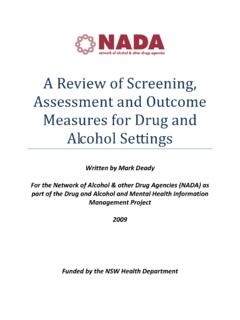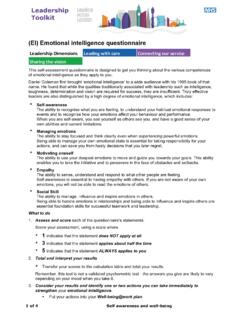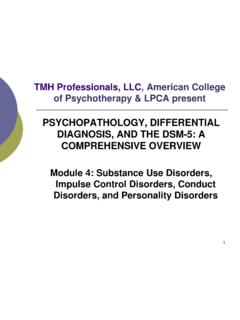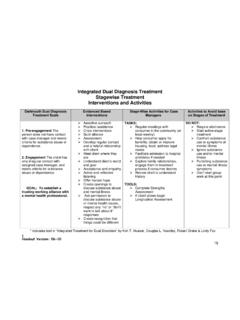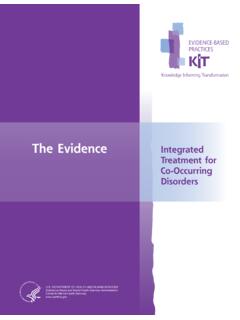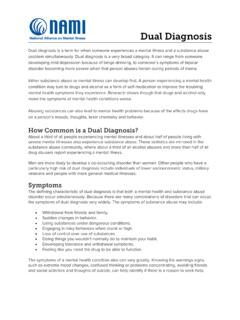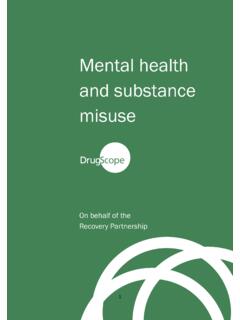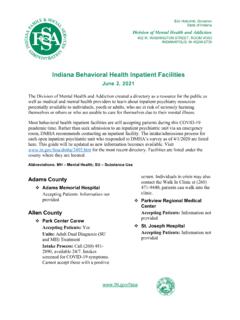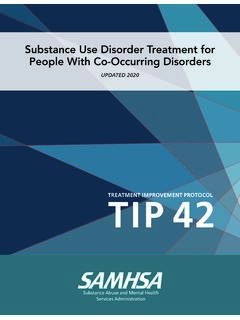Transcription of MENTAL HEALTH & SUBSTANCE USE - Drugs and Alcohol
1 MENTAL . HEALTH &. SUBSTANCE USE. Essential Information for Social Workers A BASW Pocket Guide Supported by: Bedford and Luton 1 31/08/2012 10:59. Purpose of the guide This guide seeks to support Social Workers in their practice with people who use substances and who experience MENTAL distress. It will also be relevant for other social and HEALTH care professionals. The information in the guide should be supplemented by further reading and learning. Contents 3 Policy Framework 5 Links between MENTAL HEALTH & SUBSTANCE Use 6 Impact on MENTAL HEALTH 8 Cannabis & MENTAL HEALTH 9 Medication & MENTAL HEALTH 10 Assessment 12 Risk Assessment 13 Intervention 14 Partnership Practice 15 Resources 16 Local Contact Information Terminology and definitions S.
2 Ome service users object to the use of ill' or illness '. in relation to their MENTAL HEALTH . Others do not. MENTAL distress is the term adopted to cover both viewpoints. S. ubstance use refers to the use of Alcohol and other Drugs . C. o-existing SUBSTANCE use and MENTAL distress is preferred instead of dual diagnosis '. It reflects a social model of the relationship between the two issues rather than one that relies on formal diagnoses. 2 31/08/2012 10:59. POLICY FRAMEWORK: SUBSTANCE USE. & MENTAL HEALTH . National policy has repeatedly highlighted the vulnerability of people with co-existing SUBSTANCE use and MENTAL distress and the need for all front line services to respond to both issues together. In particular it has highlighted the need for specialist SUBSTANCE use and MENTAL HEALTH services to work in partnership with each other.
3 Current guidance from the National Institute for HEALTH and Clinical Excellence on working with co-existing issues states that services should: Have guidelines for assessing these overlapping issues. Work in close partnership with other services. I nvolve service users and remain person-centred in service delivery. Involve families in assessment of need and in planning care. Communicate well and in other languages or formats where appropriate. Provide relevant information to those involved. 3. 3 31/08/2012 10:59. POLICY FRAMEWORK (cont.). In terms of the law, the MENTAL HEALTH Act 1983 (amended 2007) states: dependence on Alcohol and Drugs is not considered to be a disorder or disability of the mind . People cannot be detained under the Act on the basis of SUBSTANCE dependence alone.
4 However, a person could be detained if SUBSTANCE dependence: a. co-exists with a MENTAL disorder . b. results in a MENTAL disorder, or c. is related to a MENTAL disorder. This includes the MENTAL distress people can experience withdrawing from substances, confusion, hallucinations. It also includes people who have brain damage as a result of their SUBSTANCE use. Memory loss and confusion can be symptoms of such damage, Wernicke's encephalopathy and/or Korsakoff's amnesic syndrome in the case of chronic Alcohol use. 4. 4 31/08/2012 10:59. LINKS BETWEEN MENTAL HEALTH . & SUBSTANCE USE. People use substances because of the impact they have on the way they feel and think. The impact substances have will depend on the individual's MENTAL and physical state as well as the nature and intensity of any MENTAL distress.
5 It will also depend on factors including the type, quantity and mix of substances used, including prescribed medication, as well as the amount the individual is used to taking and the route of administration. There are several ways in which the two issues are linked: MENTAL distress may lead to SUBSTANCE use as a way of coping with symptoms or other problems. SUBSTANCE use may lead to, or trigger, MENTAL distress. SUBSTANCE use may make pre-existing MENTAL distress worse. SUBSTANCE use may result in symptoms resembling those associated with psychiatric diagnoses. Substances may be used to self-medicate the side effects of psychiatric medication. Substances may be used as a form of self-harm (which is also a way of coping). 5. 5 31/08/2012 10:59.
6 IMPACT ON MENTAL HEALTH . Any SUBSTANCE , be it prescribed or not, has an impact on the body's central nervous system (CNS). When people take substances it will affect their physical and MENTAL state. The following table gives examples of the broad effects of substances on the way people think and feel: SUBSTANCE group Possible effects Depressants Depress the CNS. Relief of tension and ( Alcohol , solvents, anxiety. Feeling of well-being and calm. sleeping tablets Possible drowsiness and loss of benzodiazepines, concentration. diazepam). Stimulants Stimulate the CNS. Feeling more lively (cocaine, ecstasy, and awake. Increased energy and amphetamine, heightened mood. Increased stamina. steroids, khat, Nervousness, anxiety and sleep loss. GHB) Alter perceptual Change people's perceptions.
7 Heightened function senses and mood. Visual distortions (cannabis, LSD, and hallucinations. Euphoria and feelings ketamine) of floating. Reduce pain Reduce sensitivity to pain. Feelings of (heroin, codeine, warmth and contentment. Sedation and methadone etc) sleep. Can mask symptoms of MENTAL distress. NB. At high levels of SUBSTANCE use, or when withdrawing from heavy use, symptoms of psychosis are possible. 6. 6 31/08/2012 10:59. IMPACT ON MENTAL HEALTH (cont.). Remember: 1. The effects of substances will vary from person to person depending on what other substances they have taken, as well as their pre-existing MENTAL state. People will often take a mixture of substances. 2. The negative effects of some substances mimic signs of MENTAL distress.
8 For example, people who use cannabis can experience paranoia, anxiety, and panic attacks. 3. Be aware that a person using substances may be suffering from psychiatric illness and not be correctly medicated or diagnosed. 4. Withdrawing from substances can result in changes in a person's MENTAL HEALTH . For example, people withdrawing from heavy Alcohol use can experience visual hallucinations as well as physical symptoms. 5. These changes can be so severe that people may use substances to stop or relieve the unpleasantness. NB. Sudden cessation or withdrawal from Alcohol can be fatal. 6. Experts advise you to focus on supporting people with both issues rather than lose time trying to work out which comes first. 7. 7 31/08/2012 10:59. CANNABIS & MENTAL HEALTH .
9 There are many types of cannabis each with different strengths. These different types can have different effects on people. The main ingredient of cannabis is THC (tetrahydrocannabinol) which can make people feel chilled out but can also cause MENTAL distress and hallucinations. Does cannabis cause psychiatric illness or not? There is no simple answer. Some evidence says cannabis use can lead to MENTAL distress or psychiatric illness , some says it does not. Other evidence shows that it worsens existing MENTAL distress and may trigger underlying psychiatric problems. We do know that most people use cannabis without experiencing problems. The impact of cannabis on a person's MENTAL HEALTH depends on the individual and their pre-existing physical HEALTH problems or experiences of MENTAL distress.
10 Young people appear to be significantly more vulnerable to MENTAL distress linked to cannabis use, particularly if they start using at an early age. 8. 8 31/08/2012 10:59. MEDICATION & MENTAL HEALTH . When people are taking prescribed medication, SUBSTANCE use can reduce, increase or cancel out the effects of the medication. Some people will combine substances and medication for the extra buzz' they get, even though it may not help alleviate their MENTAL distress. However, many psychiatric medications should not to be taken with Alcohol or other Drugs . For example, taking diazepam and Alcohol will increase drowsiness. Similarly taking cannabis with some anti-depressants can make confusion and anxiety worse. When people use substances as well as their medication, you need to explore why.


